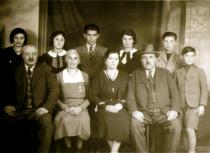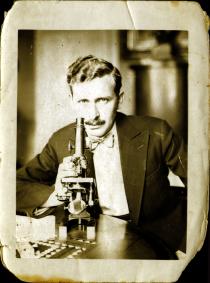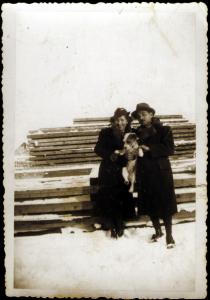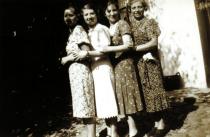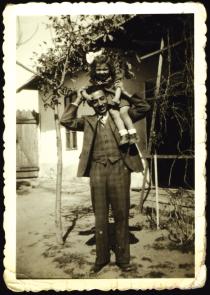Aranka Friedmann
This is my mother, Aranka Friedmann, nee Pollak, in front of our house in Eger in 1939. This was a rural house in fact. There were three apartments in it. The Rosenbergs, from whom we rented our flat, lived in one, the Szerenyis in the other and we in the third flat. The house was on Dobo Street.
In Eger most Jews lived in one quarter, in the center of town, in Dobo Street, Dobo Square and Magyar Street. It had developed like this by chance, but when I think of it, I can see the stores in my mind's eye. Grocery, haberdashery and whatnot. Almost all my relatives were storekeepers. The Jews were mainly involved in commerce; they were greengrocers, they had various stores. There were non-Jews in this quarter as well, but not too many. And there were some Jews scattered in other parts of the town because Jews continued to come to live in Eger from the villages around. But Jews and non-Jews didn't mix, Jews didn't move to the Christian quarters.
Our apartment wasn't big. We had two rooms, one for the parents and one for the children. There was a small stove in the room, and wooden floors - I remember that we had to scrub them. Electricity had already been installed in Eger by that time. But the water pipes were only installed in the second half of the 1930s. There were one or two artesian wells, and we used to go there with a bucket to get drinking water. Everybody had rainwater in a barrel in his yard. We had rainwater in the summer, too, we collected it from the gutter.
Mom was a housewife, as all women at that time who had many children. We were four siblings and that was already considered many children. We had a servant. In the countryside everybody had Hungarian village girls as servants, and so did we. This was in fashion at that time, it was a rule, one had to comply with it. Servants came from the countryside. There were people who recommended them, that is, middlemen who did this for a living, but people usually got their servants through acquaintances rather than through them. The servants didn't change often, we had several who stayed with us for years. But I remember the apprentices more because they helped a lot. When Mom was very much behind with something, they helped to do the shopping or carry heavy loads and things like that.



